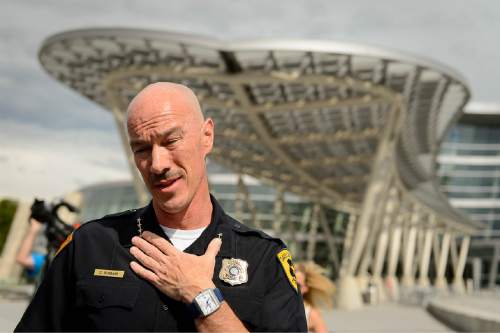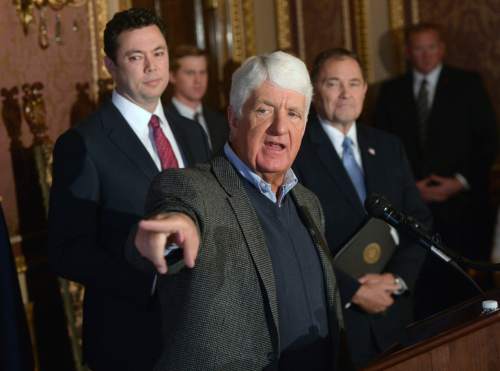This is an archived article that was published on sltrib.com in 2016, and information in the article may be outdated. It is provided only for personal research purposes and may not be reprinted.
House Oversight Committee Chairman Jason Chaffetz, R-Utah, slammed the Obama administration Thursday for not deporting thousands of undocumented immigrants convicted of crimes — who he said often commit additional crimes, including murder.
Sarah Saldaña, director of U.S. Immigration and Customs Enforcement (ICE), fired back that Chaffetz's accusations are misleading and are being "bandied about as a political football."
Among other witnesses at a hearing who countered Chaffetz was former Salt Lake City Police Chief Chris Burbank. He suggested Congress is partially to blame for problems by failing to pass immigration reform.
Chaffetz asked an aide to hold up a picture of the Notre Dame football stadium and said it could not hold the 80,000-plus criminally convicted undocumented people whom ICE decided to release in recent years.
"They got caught committing a crime. They were convicted of a crime. And instead of deporting them, you put them back into the public and they committed more crimes," Chaffetz told Saldaña in a raised voice.
He said that last year, for example, ICE released 19,723 people who had been convicted of a combined 64,179 crimes, including 134 sex offenses, 216 kidnappings and "196 homicide-related convictions."
Looking at families of some murder victims at the hearing, Chaffetz asked Saldaña, "How can you look those people in the eye? How do you go back to a family and say, 'Well, we had them in detention and we thought it would be better to just let them out …?' This is so wholly unacceptable."
Saldaña argued that court orders led to the release of the vast majority of such people. She said Congress passed the laws that require bail for many others who were released. Relatively few, she added, were released simply because ICE figured they posed little threat.
Saldaña told Chaffetz that his assertion that ICE routinely is "choosing to release criminals is absolutely unforgivable."
But Chaffetz said that in thousands of cases, "You could have deported them, and you chose not to. And it's just infuriating."
Burbank, now director of law enforcement engagement for the Center for Policing Equity, testified that the best way to solve such problems would be for Congress to pass immigration reform and bring millions of undocumented immigrants out of the shadows.
"Just as we have been unable to incarcerate our way out of crime, we will never solve immigration issues through deportation," he said. "Immigrants are ever increasingly stereotyped and demonized inappropriately for their involvement in criminal activity."
He worried about calls for local police to help ICE with stricter immigration enforcement.
"Immigration enforcement can only be accomplished through racial profiling," Burbank said, so it could lead to police losing the trust of immigrants and minorities.
"Many law enforcement officials across the nation are troubled at the proposition of mandatory immigration enforcement practices that appear motivated by prejudice."
Chaffetz told Burbank, "You are totally on the wrong planet."





